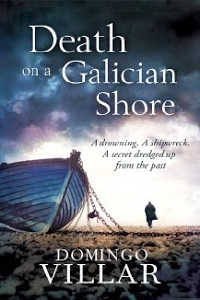Death on a Galician shore – Domingo Villar
 I have already visited Spain in the course of my crime fiction ‘world tour’, and thoroughly enjoyed authors as different as Manuel Vazquez Montalban and Alicia Gimenez Bartlett.
I have already visited Spain in the course of my crime fiction ‘world tour’, and thoroughly enjoyed authors as different as Manuel Vazquez Montalban and Alicia Gimenez Bartlett.
Yet I couldn’t resist the temptation to add Domingo Villar to my collection, for three reasons. Firstly because he writes in gallego (Galician), a hybrid language which is more Portuguese than Castilian, spoken by over 3 million people in Galicia and the Asturias. Secondly, because I had the chance to meet him personally at a recent European crime fiction workshop in London. And thirdly because I was intrigued by Detective Inspector Leo Caldas, another member of the eminent family of cops who ply their investigative trade in seaside cities (such as Commissario Montalbano in Sicily or John Rebus in Edinburgh).
Reading ‘Death on a Galician Shore’, the second novel in the Caldas series (the first being ‘Water-blue Eyes’, published by Arcadia) I truly fell for the Galician detective. I immediately took to his thoughtful, rather shy personality, as well as to his patience and sharpness. He’s not a rebel like Rebus, or an explosive, Latin mixture of reason and impulse, like Montalbano. Yet Villar, with his light narrative touch, adroitly sketches the compelling combination of calculation and instinct which, together with his professional stubbornness, guides Caldas through the investigation on the death of Justo Castelo. A drowned fisherman, maybe a suicide, maybe not, who was intimately connected with a tragedy at sea ten years before.
The sea itself, in fact the Atlantic Ocean, chiselling the rugged Galician shores with its brute force, is the other main character in Villar’s novel. You can hear its breath and its roar, you can smell it on the briny breeze and feel its presence being constantly evoked in fishermen’s and sailors’ tales. The ocean becomes a blanket, another layer of silence on top of the locals’ diffidence, making the job of Caldas and his assistant, Estevez, all the more difficult. Villar paints the complex picture of a sensitive investigator, who has to navigate tricky family circumstances too. It will take all of Caldas’ intuition and determination to finally find the right thread, while rummaging into a past made hazier by present events. And by the desire of some of the characters to conceal the tragedies they were once involved in.
I value Villar’s ability to seduce the reader not so much with dramatic turns of events, rather with the subtle suspense that comes from the curiosity, the yearning to understand what’s hidden behind the death of Justo Castelo. And to be thrilled by the personal stories of characters who lead an apparently mundane life, and yet conceal secrets and anxieties, fears and hopes, love and hatred.
This is a classic police procedural novel. Villar’s ability in breathing life into his characters, and in engaging the reader in the antiquated world of Galician fishermen, make it an excellent example of the canon, one which, thanks to ‘maritime’ detectives too, always offers a safe haven for crime fiction readers.






